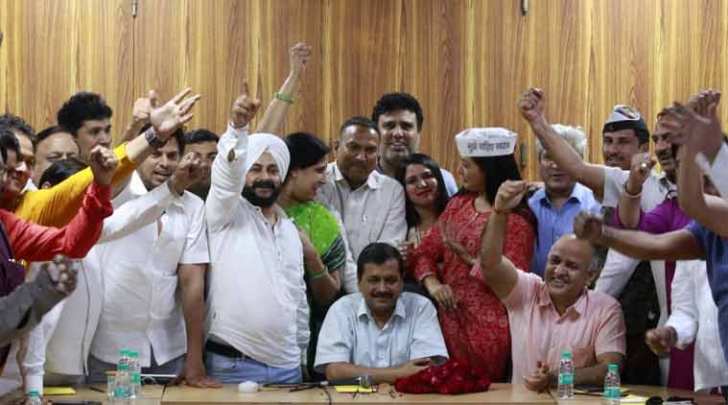Office of Profit case: The AAP government and its support system went into celebration mode after the Delhi High Court sent back the disqualification of 20 AAP MLAs to the Election Commission. The High Court further asked the Election Commission to give individual hearings to the disqualified MLAs before taking any decision on their disqualification on the allegation of their holding an office of profit.
The Delhi Chief Minister soon started to spin the High Court order as an AAP victory. This was followed by similar comments from other AAP spokespersons. Delhi Chief Minister Kejriwal hailed the court order as a victory for Delhi (this being only in personal interest of the AAP it is difficult to understand how the people of Delhi stand to gain).
सत्य की जीत हुई। दिल्ली के लोगों द्वारा चुने हुए प्रतिनिधियों को ग़लत तरीक़े से बर्खास्त किया गया था। दिल्ली हाई कोर्ट ने दिल्ली के लोगों को न्याय दिया। दिल्ली के लोगों की बड़ी जीत। दिल्ली के लोगों को बधाई। https://t.co/eDayHziHSn
— Arvind Kejriwal (@ArvindKejriwal) March 23, 2018
Delhi High Court ruling is a big relief for @ArvindKejriwal and a sad commentary on the institution of the Election Commission whose impartiality has come under a cloud for some time
— Nidhi Razdan (@Nidhi) March 23, 2018
So finally Congress pays heed to what I suggested more than a year ago! Our real impact will be when the EC finally reintroduces ballot papers. https://t.co/fFujULDzxz
— Rifat Jawaid (@RifatJawaid) March 17, 2018
The AAP and its supporters in the media and other walks of life are acting as if the AAP has won the final battle. However, the reality is that a strong case is made out against the AAP MLAs who had clearly held an office of profit disqualifying them as members of the legislative assembly.
The poll panel’s order advising the president to disqualify the 20 AAP MLAs has not been set aside by the High Court. The case has merely been remanded back to the Election Commission.
Therefore, the erring MLAs won’t go scot free and if they have indeed held an office of profit they will ultimately be made to bear the consequences.
Prima facie, it seems that the AAP MLAs had held the post of Parliamentary Secretary in blatant violation of Article 191 of the Constitution of India. It prohibits holding an office of profit by an MLA though the ‘office of profit’ is not defined in the Constitution or any statute. The basic aim behind the prohibition is to uphold the independence of the legislature and avoid unwarranted interference by the executive. Due to this reason, a liberal interpretation of the term “office of profit” must be taken. The definition and the test of determining whether an office is an office of profit has been developed by judicial precedents.
Five tests have been laid down:
(i) whether the government makes the appointment;
(ii) whether the government has the right to remove or dismiss the holder;
(iii) whether the government pays remuneration;
(iv)what the functions of the holder are; and
(v) does the government exercise any control over the performance of these functions.
But the Supreme Court has held that the above said tests do not need to necessarily coexist for determining whether an office is an office of profit under the government. The AAP has continuously been using the defense that since no remuneration was being provided to the MLAs the appointments as Parliamentary Secretary do not amount to an office of profit. However, this argument seems totally erroneous in view of the aforementioned propositions. The true test as to whether the respondent is holding an office of profit is not whether the holder is being given any remuneration, monetary or otherwise, but whether he can be entitled to such remuneration. Where a chance of getting remuneration is created, it amounts to an office of profit. In the current case, most of the tests laid down by the apex court seem to be satisfied. Even though the matter has been remanded back, the AAP will have a tough time defending the controversial appointments.
The general narrative that the AAP is trying to create is that the Election Commission succumbed to pressure and that the Modi Government is trying to influence the constitutional body.
However, it must be borne in mind that the Election Commission is an independent body and a mistake made by an independent administrative body should not be politicized. The Central Government does not exercise administrative control over the Election Commission in any manner. It is a neutral body and the current matter is between the AAP MLAs and the Election Commission only. The BJP or the Modi government does not have a role to play in any manner.
The AAP and Delhi CM were quiet for some time now. However, after this High Court order it seems that they will once again start with their trademark dramatics. Their dramatics however are no longer able to manipulate the public and on the face of the “office of profit” controversy it does not seem that the AAP will be able to save its erring MLAs for long.
